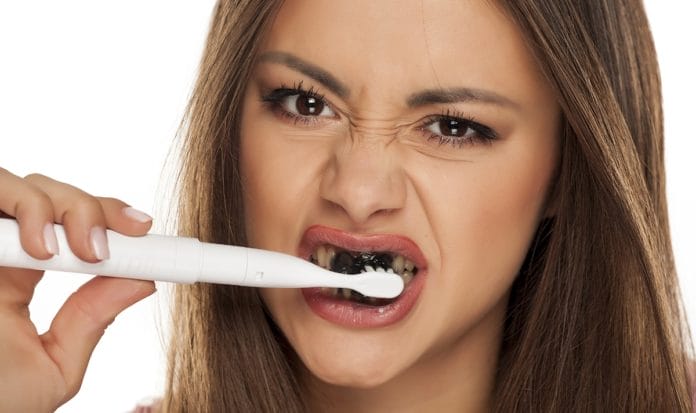Charcoal toothpastes are gaining popularity across the globe. From Southeast Asia to the West Coast of the United States, a growing number of patients are asking their dental hygienists about charcoal toothpaste. Responding to these inquiries is not always easy because savvy marketing tactics and social media bloggers promote charcoal toothpaste as a natural toothpaste alternative that can effectively whiten teeth. But as a dental professional, it is your responsibility to refute any non-scientifically proven claims and outline the risks of charcoal toothpaste to your patients.
Why are charcoal toothpastes gaining popularity in some circles?
Many patients who use charcoal toothpaste often initially try it because they believe reports that charcoal paste has deep cleaning, anti-bacterial properties. Some environmentally-conscious consumers decide to try it because the toothpaste packaging claims that the toothpaste is “eco-friendly” or a “natural” alternative to peroxide. Those consumers then believe that they are investing in a product that is good for the environment.
At the heart of these beliefs are marketing campaigns that lead consumers to believe the hype that charcoal toothpaste is superior to standard fluoride toothpaste. Royal Pharmaceutical Society members Linda Greenwall and Nairn H F Wilson explain how these enticing marketing campaigns have spurred consumer interest in charcoal toothpaste:
The marketing campaigns for these toothpastes are fashionable, trendy, and different to those for other toothpastes. This marketing has enjoyed considerable success, encouraging the introduction of related products, including ‘charcoal toothbrushes,’ which have charcoal incorporated into the bristles.
– Linda Greenwall and Nairn H F Wilson, Royal Pharmaceutical Society
Are there any past research studies that support the benefits of charcoal toothpaste?
No. Researchers John K. Brooks, DDS, Nasir Bashirelahi, Ph.D., and Mark A Reynolds, DDS, Ph.D., conducted an extensive literature review of clinical studies that focused on the efficacy of charcoal toothpaste. The review included a comprehensive search of the Scopus and MEDLINE databases for clinical studies that focused on the use of charcoal in dental applications. Key points of the literature review include the following:
- The researchers uncovered 118 articles that were potentially eligible for consideration in the review
- Advertising promotions were also reviewed to analyze product assertions
- 13 studies referenced the use of charcoal or soot to brush teeth, but they did not meet recommended inclusion criteria for the review
The review “showed insufficient clinical and laboratory data to substantiate the safety and efficacy claims of charcoal and charcoal-based dentifrices.” Even more disturbing, the research team found internet advertisements that “included unsubstantiated therapeutic claims such as antibacterial, antifungal, antiviral, and oral detoxification, as well as potentially misleading product assertions.”
Do recent studies point to any benefits of charcoal toothpaste?
No. In fact, a study published by the British Dental Journal notes that charcoal toothpaste will not whiten teeth. Even worse, the researchers found that using charcoal toothpaste could actually be detrimental to oral health. Dr. Joseph Greenwall-Cohen, one of the researchers involved with the study, summarizes the lack of benefits of charcoal toothpaste as follows:
The evidence highlighting any potential benefits of charcoal toothpaste over regular toothpaste is severely lacking. In general, I would encourage all people to stick to regular toothpaste over charcoal toothpaste.
– Dr. Joseph Greenwall-Cohen, Researcher, University of Manchester Dental School
What are some of the risks associated with charcoal toothpaste?
Researchers continue to uncover pitfalls and health risks associated with charcoal toothpastes. For example, in the British review discussed above, only 8 percent of charcoal toothpastes contained fluoride, an ingredient which is necessary to earn the American Dental Association (ADA) Seal of Acceptance. Toothpastes that do not carry this seal are not exposed to the same degree of rigorous testing and approval. Some brands also may contain harmful chemicals and ingredients. Here are a few of the top risks associated with charcoal toothpaste:
1) Increased tooth decay
Without fluoride, a toothpaste’s ability to remineralize teeth and prevent tooth decay is lessened. Over 90 percent of the toothpastes reviewed in the British study above lacked fluoride, which means that users might be at an increased risk for dental caries.
Further, charcoal deactivates fluoride, which eliminates fluoride’s protection if a charcoal toothpaste does contain fluoride. Again, this could leave a patient at increased risk of decay.
2) Unexpected discoloration
In order to whiten or remove stains, bleaching agents are required. The overwhelming majority of charcoal pastes lack these agents, leaving teeth at a heightened risk for discoloration. Additionally, charcoal pastes may damage tooth enamel, which can leave teeth more vulnerable to staining and decay.
3) Cancer
I have concerns about the chronic exposure of the oral mucosa (tissue) to charcoal as the federal government has classified charcoal as a carcinogen. Another potential health concern we uncovered was that one-third of the 50 brands of charcoal toothpaste we investigated included bentonite clay, a mineral that may contain crystalline silica, another recognized carcinogen by the federal government.
– Dr. John Brooks, Researcher, University of Maryland School of Dentistry
A growing number of researchers are concerned about the link between charcoal and cancer. Charcoal is classified as a carcinogen by many federal governments, yet is the active ingredient in promoted charcoal toothpastes. Additionally, many brands of charcoal toothpaste feature crystalline silica, which is also recognized as a carcinogen.
What should you do if you have patients who ask about charcoal toothpaste?
Based upon the lack of clinical and laboratory data to support the use of charcoal toothpastes and the increased risk of damage to teeth, dentist and dental hygienists should not recommend charcoal toothpastes to patients. In some cases, patients may reference social media conversations or “news” they heard about benefits of charcoal toothpastes. When this happens, you can educate your patients with three simple steps:
1) First, explain that there are no proven research studies that support the claims that charcoal toothpaste is beneficial to teeth.
2) Point to recent studies that show the damage that charcoal toothpaste can potentially cause to your teeth.
3) Recommend a clinically proven toothpaste and outline the benefits. If possible, send the patient home with a sample of that toothpaste.
In addition to these three steps, you can discuss other proven alternatives that patients can explore to achieve their goals. For example, if the patient is seeking whiter teeth, you can review in-office tooth whitening options. The key is to offer a safe, proven alternative that will enable the patient to achieve their oral health goals safely and without the risk of damage.











